|
|
|
Sort Order |
|
|
|
Items / Page
|
|
|
|
|
|
|
| Srl | Item |
| 1 |
ID:
105232


|
|
|
|
|
| Publication |
2011.
|
| Summary/Abstract |
The application of psychological perspectives to international studies (IS) is an area of growing research. This review provides a brief overview of interdisciplinary scholarship on psychology in IS, with a particular description of its application to examining traumatic stress. Psychological variables and methods can help IS to achieve greater explanatory power. Using a variety of methods such as surveys, simulations, and case studies to investigate psychological constructs in the international context can overcome the limitations of relying on any single approach. Several psychological constructs with potential applicability to understanding traumatic stress in particular are discussed to illustrate the application and limitations of psychological perspectives in IS. With so many theories and methods, psychology offers rich future possibilities for novel ways to examine IS.
|
|
|
|
|
|
|
|
|
|
|
|
|
|
|
|
| 2 |
ID:
135895


|
|
|
|
|
| Summary/Abstract |
Leaders remain subject to the same biological determinants and pressures that affect other humans. Yet, they also differ in their ability to regulate and marshal their emotions just as they diverge in their other skills, talents, limitations, and abilities. In particular, some are better at channeling their emotions to help shape foreign policy more efficiently than others. One of the most potent and powerful emotions with which leaders have to contend, particularly under conditions of provocation, is anger. Anger can influence judgment and decision making in systematic and predictable ways. Individual heritable differences can influence the conditions under which anger leads to aggressive action. Such differences can influence not only the environments into which leaders select, but also the ways they process and interpret information; these determinations can decisively influence the outcome of significant public policies, including decisions on conflict and war. As a result, emotion regulation can play a strategic role in leadership. Examples from several recent presidencies illustrate how such individual differences play out on the world stage.
|
|
|
|
|
|
|
|
|
|
|
|
|
|
|
|
| 3 |
ID:
082623
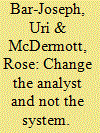

|
|
|
|
|
| Publication |
2008.
|
| Summary/Abstract |
Recent intelligence failures, including first and foremost the mistaken estimate of Iraq's weapons of mass destruction (WMD) prior to the war, show that a prime source of such failures is the adherence by analysts to preconceptions (or mind-sets) which entail the rejection of new information that contradicts it. The source of this kind of problem lies in well known psychological mechanisms. Yet official investigations into intelligence blunders have typically ignored this problem or have not suggested an appropriate solution thus far. Our paper suggests an original approach based on the fact that certain types of personalities are more likely than others to fall victim to these biased judgments. Existing psychological tests can help determine individual susceptibility to such tendencies. Therefore we suggest that intelligence organizations should pay far more attention to these personality characteristics, especially an analyst's level of openness, in recruitment, training, and promotion. Such attention would help create more effective reforms in intelligence than organizational models which advocate "devil's advocate" kind of solutions.
|
|
|
|
|
|
|
|
|
|
|
|
|
|
|
|
| 4 |
ID:
020355
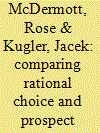

|
|
|
|
|
| Publication |
Sept 2001.
|
| Description |
49-85
|
|
|
|
|
|
|
|
|
|
|
|
|
|
|
|
| 5 |
ID:
096186


|
|
|
|
|
| Publication |
2010.
|
| Summary/Abstract |
During a recent meeting of the APSA Committee on Publications, headed by Lisa Martin, we discussed a proposal that had been put forward to encourage authors to deposit their data in a central repository to provide more centralized access for others seeking to replicate or extend prior work. Such a strategy should ostensibly make it easier for methodological, theoretical, and empirical work to flourish and cumulate.
|
|
|
|
|
|
|
|
|
|
|
|
|
|
|
|
| 6 |
ID:
102074
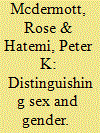

|
|
|
| 7 |
ID:
096201
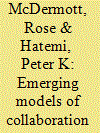

|
|
|
|
|
| Publication |
2010.
|
| Summary/Abstract |
In increasing numbers, political scientists are engaging in collaborative research. It is useful to consider the advantages of such efforts and to suggest strategies for finding optimal collaborators. In addition, there are issues and challenges that arise in the face of increased collaboration, particularly interdisciplinary collaboration across the life and social sciences. Inevitably, as the discipline has moved from a dominant solo-author model to a wider array of authorship possibilities, whether those teams encompass two-person partnerships, large research teams, or something in between, new administrative and cultural questions have already begun to surface as the discipline works to assimilate these changes. Consonant with previous efforts by the American Political Science Association (Biggs 2008; Chandra et al. 2006), we seek here to continue a broader disciplinary conversation surrounding the opportunities and challenges posed by more diverse patterns of teamwork. In so doing, we hope to help continue to encourage transparent, predictable, and openly collaborative intellectual partnerships wherein individuals receive the institutional credit and merit they deserve.
|
|
|
|
|
|
|
|
|
|
|
|
|
|
|
|
| 8 |
ID:
152820


|
|
|
|
|
| Summary/Abstract |
We combine evolutionary and neurobiological models to provide a theoretically rigorous framework for understanding the origin of political leadership in democratic structures and how such qualities interact with institutional incentives and constraints. Evolutionary, behavioral-genetic, neuropsychological, and physiological studies have identified biological systems related to particular types of leadership behaviors as well as the emergence of leadership itself. These biological systems emerge during specific life stages and interact with a person's life history, influencing the environments one selects into and the perception of those experiences and subsequent reactions to them; these circumstances reinforce, suppress, and inspire various leadership characteristics. Our framework provides insight into the foundational basis of leadership qualities and explains why and how we observe variation in such traits. The evolutionary functions of leadership, including approaches to collective action problems, leader–follower dynamics, institutional and organizational environments, and leader attributes are discussed, and in so doing, we propose several novel questions that can be addressed from this perspective, which suggest new and fruitful lines of research in leadership studies.
|
|
|
|
|
|
|
|
|
|
|
|
|
|
|
|
| 9 |
ID:
156921


|
|
|
|
|
| Summary/Abstract |
Coercion can be employed both to entice people to do something they do not want to do, as well as to force them to stop doing something they want to do. Yet, some influence strategies work better than others. Current policy undermines coercive goals by depending on economic models for incentivizing behavior which are totally at odds with human psychology. Psychological models provide more accurate understandings of the nature of coercion, and offer more effective strategies for accomplishing such goals. Such an approach might improve both our understanding and practice of coercion in real-life decision-making situations.
|
|
|
|
|
|
|
|
|
|
|
|
|
|
|
|
| 10 |
ID:
103578
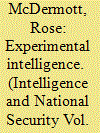

|
|
|
|
|
| Publication |
2011.
|
| Summary/Abstract |
This article explores the use and application of experimental methodologies in intelligence analysis. Previous experimental work has much to tell us about how people process information in making judgments. Calibration, and how appropriate levels of confidence might be improved with systematic feedback, is addressed. Training around uncertainty biases is covered. Extant experimental work suggests mechanisms and tests which might be used to better screen potential analysts for personality characteristics that might make them more suited for some tasks over others. The paradigm of experimental manipulation serves as a useful template for exploring alternative conceptualizations of uncertain environments.
|
|
|
|
|
|
|
|
|
|
|
|
|
|
|
|
| 11 |
ID:
100790
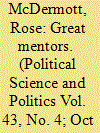

|
|
|
|
|
| Publication |
2010.
|
| Summary/Abstract |
I have been extremely blessed in my life to have benefitted from some amazing mentors and friends in both psychology (most notably, Amos Tversky, Phil Zimbardo, and Leda Cosmides) and political science. Inspired by the occasion of Robert Jervis' festschrift, which importantly does not signal his imminent retirement, I was prompted to take advantage of this opportunity to express my deep and abiding appreciation for his advice and guidance over the years. In keeping with Kristen Monroe's model of three, I also reflect here on the critical roles that two additional mentors, Bruce Bueno de Mesquita and Peter Katzenstein, have had on my career and my life.
|
|
|
|
|
|
|
|
|
|
|
|
|
|
|
|
| 12 |
ID:
085679


|
|
|
|
|
| Publication |
2009.
|
| Summary/Abstract |
Does the security of women influence the security and behavior of states? Existing evidence linking the situation of women to state-level variables such as economic prosperity and growth, health, and corruption is fairly conclusive. Questions remain, however, concerning the degree to which state security and state security-related behavior is linked to the security of women. The "women and peace" thesis draws upon evolutionary biology/psychology for ultimate causes of this linkage, and sociological theories of social diffusion and psychological theories of social learning for more proximate causal mechanisms. Together, a new data resource-the WomanStats Database-and conventional methodology find a robust, positive relationship between the physical security of women and three measures of state security and peacefulness. In addition, a comparison of this proposition to alternative explanations involving level of democracy, level of economic development, and civilizational identity shows that the physical security of women is a better predictor of state security and peacefulness. Although these results are preliminary, it is still possible to conclude that the security of women must not be overlooked in the study of state security, especially given that the research questions to be raised and the policy initiatives to be considered in the promotion of security will differ markedly if the security of women is seriously considered as a significant influence on state security.
|
|
|
|
|
|
|
|
|
|
|
|
|
|
|
|
| 13 |
ID:
125131


|
|
|
|
|
| Publication |
2013.
|
| Summary/Abstract |
Political scientists tend to focus on environmental triggers as the primary precipitating cause for political violence. However, little has been done to explain why certain individuals faced with certain pressures resort to violence, while others confronting the same situation seek out diplomatic and peaceful resolutions to conflict. Here, using two independent samples, we explore the interaction between genetic disposition and violent early life events and their influence on engaging in physical violence. We find that individuals with the low-activity form of monoamine oxidase-A, who are exposed to violence in youth have a greater likelihood of engaging in physical aggression later in adulthood. Our findings hold important implications for the value of environmental intervention in communities besieged by political violence in order to reduce the likelihood of the intergenerational transfer of its propensity
|
|
|
|
|
|
|
|
|
|
|
|
|
|
|
|
| 14 |
ID:
111920


|
|
|
|
|
| Publication |
2012.
|
| Summary/Abstract |
A great deal of foreign policy analysis relies on social and environmental factors, or anecdotal evidence. In seeking to address this problem in a more systematic manner, we move from an investigation centered around state actors to one focused on variation in individual behavior account for the combination of social, cultural, environmental, psychological, and biological differences. Our proposed approach to the study of political violence requires the integration of methods and skills from geneticists and neuroscientists with those in the behavioral and social sciences. Specifically, we seek to introduce an approach to study political violence which : (i) quantifies the effects of genes, environments, and their interaction on behavior; (ii) identifies specific genetic and environmental contexts that lead to such behavior; (iii) develops a comprehensive model of the biological and social pathways to political violence; (iv) identifies populations under specific circumstances which pose a higher or lower prevalence for any specific genes, neurobiological or environmental mechanisms which pose an increased liability for political violence; (v) develops mechanisms to identify individuals within given populations who are most at risk for committing violence, as well as those most resistant to such action; and (vi) creates environmental responses which can mitigate risk among those individuals.
|
|
|
|
|
|
|
|
|
|
|
|
|
|
|
|
| 15 |
ID:
096206


|
|
|
|
|
| Publication |
2010.
|
| Summary/Abstract |
Why are differences so political significant? Too often political science discussions of differences assume they are immutable. The attendant implication is that the political divisions attached to these variations-in religion, ethnicity, race, or any of the other dissimilarities that frequently enter political life-are considered rigid and inflexible. This commentary draws on recent work in moral and social psychology and evolutionary biology to suggest that the critical political factor surrounding differences is not their immutability but rather the moral and political salience we accord such differences. Simple experiments in social identity theory-and a conversation with an incensed 12-year old-demonstrate that the psychological process by which differences between people and groups become deemed ethically and politically relevant is totally socially constructed and hence can be restructured in a fashion that leads to more tolerant treatment of those judged different.
|
|
|
|
|
|
|
|
|
|
|
|
|
|
|
|
| 16 |
ID:
105426


|
|
|
|
|
| Publication |
2011.
|
| Summary/Abstract |
One of the concerns that has plagued research on the biological and genetic underpinnings of social behaviors and individual differences is the fear that such information can be used for ill. This fear rests on a foundation of good reason. Early abuses involving the use of selective phrenology and other purportedly "scientific" methods to establish moral hierarchies among races or between sexes have exerted profound and lasting damage on society, as well as affecting later attempts to more productively examine the biological bases of individual difference. And yet, many policies that have focused exclusively on social factors have created equal pain and suffering, although these approaches have rarely fostered as much discussion. However, despite these negative outcomes, biological research can also attack diseases, alleviate suffering, and dispel social myths that wrongfully assign blame to the victim or otherwise oversimplify behavior. Here, we argue for a similar positive valuation of such an approach in political and social research. We concentrate not on the ethics of conducting this research, but rather the ethical need for this research to be conducted.
|
|
|
|
|
|
|
|
|
|
|
|
|
|
|
|
| 17 |
ID:
177785
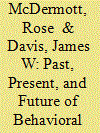

|
|
|
|
|
| Summary/Abstract |
Originally developed by applying models from cognitive psychology to the study of foreign policy decision making, the field of behavioral IR is undergoing important transformations. Building on a broader range of models, methods, and data from the fields of neuroscience, biology, and genetics, behavioral IR has moved beyond the staid debate between rational choice and psychology and instead investigates the plethora of mechanisms selected by evolution for solving adaptive problems. This opens new opportunities for collaboration between scholars informed by rational choice and behavioral insights. Examining the interactions between the individual's genetic inheritance, social environment, and downstream behavior of individuals and groups, the emerging field of behavioral epigenetics offers novel insights into the methodological problem of aggregation that has confounded efforts to apply behavioral findings to IR. In the first instance empirical, behavioral IR raises numerous normative and philosophical questions best answered in dialogue with political and legal theorists.
|
|
|
|
|
|
|
|
|
|
|
|
|
|
|
|
| 18 |
ID:
149294
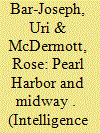

|
|
|
|
|
| Summary/Abstract |
Beginning with the attack on Pearl Harbor, the war in the Pacific was a largely losing campaign for the Americans until the Battle of Midway, on 4–5 June 1942. The American ability to predict this Japanese attack the second time around served as the turning point for the war in the Pacific. And the story of how the Americans turned a catastrophic failure into an impressive cryptological achievement involved the story of one man, Joe Rochefort, convincing another man, Admiral Chester Nimitz who commanded the Pacific Fleet, that he could trust his analysis of the intelligence he compiled and analyzed.
|
|
|
|
|
|
|
|
|
|
|
|
|
|
|
|
| 19 |
ID:
116467


|
|
|
|
|
| Publication |
2012.
|
| Summary/Abstract |
We explicate the precise role that one specific emotion, disgust, plays in generating political acrimony. We do this by identifying the link between the different dimensions along which moral judgments are made by those espousing different political ideologies and the different emotions which undergird these evaluations. These assessments reliably track along liberal and conservative dimensions and are linked to the way values associated with purity and sanctity elicit greater degrees of disgust among conservatives. Here, we review a growing literature showing how disgust affects the psychology of politics through its influence on the cognitive and emotional processes that govern judgments of morality, as well as its direct impact on specific policy preferences. We then apply these findings to the nature and tenor of political discourse and suggest some ways that disgust might affect the character and function of democratic debate and tolerance. Finally, we discuss what these findings mean for public policy.
|
|
|
|
|
|
|
|
|
|
|
|
|
|
|
|
| 20 |
ID:
165485


|
|
|
|
|
| Summary/Abstract |
Although both the idea and the reality of so-called fake news or disinformation campaigns long precede the Trump administration, the frequency and intensity of the discussion around its prevalence and influence have increased significantly since Donald Trump took office. In an era when technological innovations support increasingly inexpensive and easy ways to produce media that looks official, the ability to separate real from artificial has become increasingly complicated and difficult. Some of the responsibility for public manipulation certainly rests with those who present false or artificial information as real. However, their relative success depends on, at least in part, universal psychological processes that often make humans susceptible to believing things that are not true. For example, people often weigh emotional feelings more heavily than abstract facts in their decision making. This discussion examines the psychological foundations that render individuals susceptible to a post-truth media environment and allow it to emerge, escalate, and persist.
|
|
|
|
|
|
|
|
|
|
|
|
|
|
|
|
|
|
|
|
|